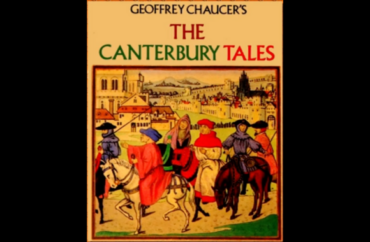
Scholars criticize the move as an ‘attempt to censor Christian beliefs’ and a ‘failure to understand…Western literary tradition’
Nottingham University has assigned Geoffrey Chaucer’s “The Canterbury Tales” a content notice for its “expressions of Christian faith.”
This move has sparked debate, with critics arguing that Christian themes are inherently part of medieval literature and should be expected by students studying texts from this period.
Chaucer’s work, published in the 1400s, is “one of the most famous works of medieval literature” and social satire, according to The Becket Story, a University of York resource on medieval authors. Chaucer’s story tells of a religious pilgrimage to visit the shrine of Saint Thomas Becket, the martyred Archbishop of Canterbury.
Emma Thorne, a UoN spokesperson, told The College Fix via email the school did not issue trigger warnings but rather “content notices” about the topics “they will be studying so they know what themes are covered and can speak to their tutors about any questions or issues beforehand.”
While Thorne did not explain the difference between trigger warnings and content notices, the UK’s Newcastle University notes that it uses the term content warning instead because it is “a gentle indication of when content is of a sensitive nature and might cause distress.”
“A trigger warning could give the impression that an action or reaction is required or inevitable; it also is more alarming in tone,” the university states.
Citing Nottingham University’s statement on the new warnings, Thorne told The Fix, “Even those students who are practicing Christians will find aspects of the late-medieval worldview they will encounter in Chaucer and others alienating and strange.”
“All students may appreciate knowing in advance about some perspectives that will be covered, for example, the anti-Islamic sentiments of some medieval writers,” she stated.
“This content notice does not discourage students from encountering any of this material, but enables questions to be raised, so as to set that material in a properly critical framework,” Thorne stated.
The school’s notices were attached to a module on Chaucer and other writers from medieval times. While the warnings alert students to violence, mental illness, and expressions of Christian faith, they make no comments on themes of antisemitism or sexually explicit materials that are present in the story.
MORE: Princeton library adds trigger warnings to ‘offensive’ archive materials
Asked why there was no content warning about the sexual and antisemitic themes in some of Chaucer’s work, Thorne told The Fix that “while Chaucer’s Canterbury Tales do indeed contain both sexual frankness and anti-Semitism, the content notice relates only to the specific texts studied on the module, not to Chaucer’s works in their entirety.”
Professors and historians have criticized the university for “demeaning education” by warning students about the religious themes of Chaucer’s story. Such themes, they suggest, should be obvious to anyone studying medieval English literature, according to the Daily Mail.
Owen Anderson, professor of philosophy at Arizona State University, told The College Fix via email that such “warnings about Christianity are attempts to censor Christian beliefs.”
“It is silly and shows the feeble mindedness of the secular academy,” he stated.
“[I]n a different way, Christianity is troubling,” Anderson stated. “It shows us that we have sinned against God and the consequences of this sin are unending. However, it is the only source of hope from this truth.”
He also stated that “… to say Christianity is only troubling is to purposely leave out that it is also the only source of true hope.”
Similarly, Jeremy Black, a British historian and former professor of history, criticized the move in an email to The Fix. He believes the university’s decision is “a failure to understand the Christian basis of much of the Western literary tradition.”
This is “a major defect that compromises intellectual integrity,” Black stated.
The debate over Chaucer’s work began to intensify in 2021. Academics in America and the United Kingdom took actions to prevent the “father of English literature” from being labeled a rapist, racist, and anti-Semite, The College Fix previously reported.
Cambridge University English Professor Jill Mann, for example, resigned from her role on the board of the Chaucer Review, an academic journal, following the publication of an essay titled “New Feminist Approaches to Chaucer.”
In the essay, authors Samantha Katz Seal and Nicole Sidhu called for feminists to “move past Chaucer,” labeling him “a rapist, a racist, an anti-Semite,” and criticizing his portrayal of a world dominated by males, Christians, the wealthy, and whites.
MORE: University puts trigger warning on Hemingway’s ‘Old Man and the Sea’:
IMAGE: Great Books on Tape/Youtube
Like The College Fix on Facebook / Follow us on Twitter






Please join the conversation about our stories on Facebook, Twitter, Instagram, Reddit, MeWe, Rumble, Gab, Minds and Gettr.